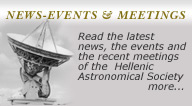|
On January 23rd the Governing Board of AstroNet approved
officially the acceptance of Greece as an Associate Member of this
European Astronomical Network. This means that Greece has no
obligation to contribute financially to the common budget, as the
partners of the AstroNet do, but as a consequence it can not benefit
from the distribution of the available funds.
The AstroNet network had already drafted a document on the
"Science Vision" of European Astronomers for the major scientific
questions that need to be addressed over the next 20 years. This
draft, which is available in the ASTRONET web site at:
http://www.astronet-eu.org/
was discussed extensively during the two and a half days workshop at
Poitiers, France between January 23 and 25, 2007. Nearly 230
astronomers from all over Europe attended the meeting. From Greece
the people attending were Prof. P. Laskarides, as the representative
of Greece and chair of the GNCA, Dr. E. Kontizas, Prof. M. Kontiza
and Prof. V. Charmandaris.
The above mentioned site, contains useful information on AstroNet.
Furthermore, in addition to the draft of the sience vision, it
contains all presentations made by the panel members, which discuss
in more detail specific science problems.
We would like to strongly encourage all members of Hel.A.S to
visit the above mentioned web site and review this very important
document. Feedback on its contents is welcomed by the ASTRONET board
and the deadline for comments is February 15, 2007.
Based on the final "Science Vision" document an "Infrastructure
Roadmap" for the development of the major astronomy facilities in
Europe will be proposed by the AstroNet board. This will be used as
guidance for the participating funding agencies for the directions
of their future funding activities.
It appears that it is of particular importance for the future of
greek astronomy that serious efforts should be made in order that we
as greek astronomers, become involved in large european astronomy
projects. It is very likely that these projects will attract most of
the science interest, as well as the astronomy funding in Europe in
the future.
|








